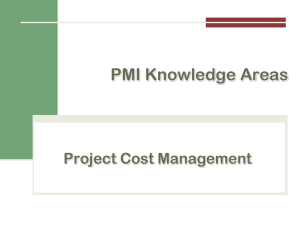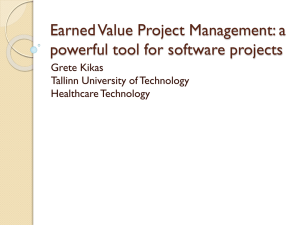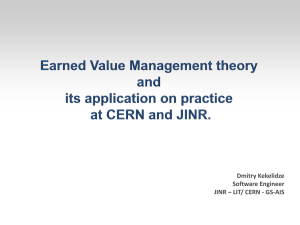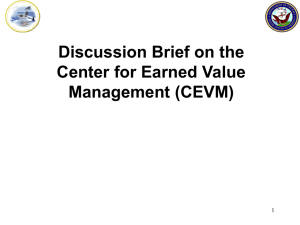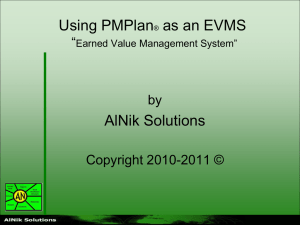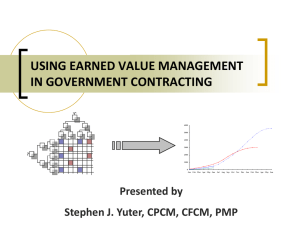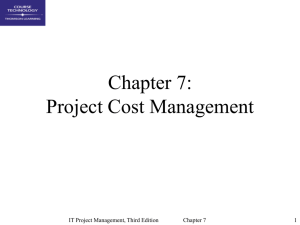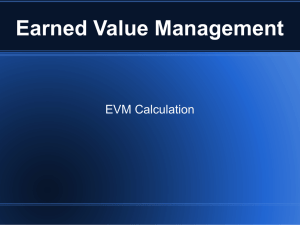Project Management Institute's - College of Performance Management
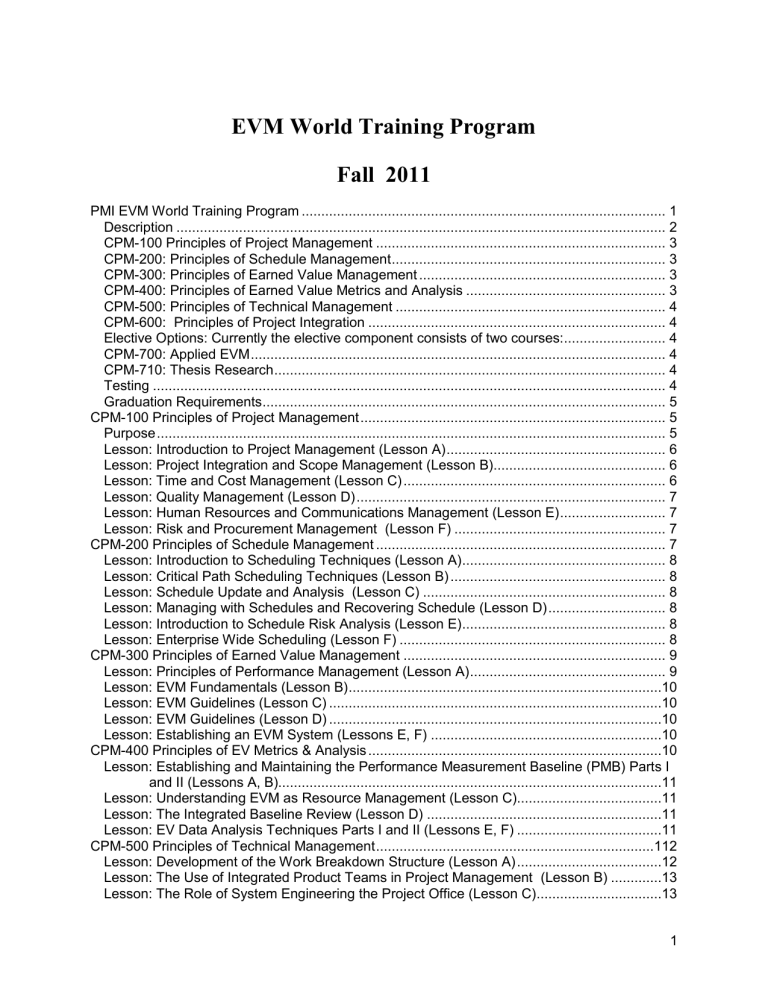
EVM World Training Program
Fall 2011
Lesson: Human Resources and Communications Management (Lesson E) ........................... 7
Lesson: Risk and Procurement Management (Lesson F) ...................................................... 7
Lesson: Managing with Schedules and Recovering Schedule (Lesson D) .............................. 8
Lesson: Understanding EVM as Resource Management (Lesson C).....................................11
Lesson: The Use of Integrated Product Teams in Project Management (Lesson B) .............13
Lesson: The Role of System Engineering the Project Office (Lesson C) ................................13
1
Lesson: Implementing Technical Performance Measurement (Lesson E) . Ошибка! Закладка не определена.
Lesson: Integrating Risk Assessment Outcomes into PMB Development (Lesson D) ............15
Description
The POI consists of training courses known as core. The purpose of the core courses is to provide a principles or foundation knowledge baseline to the student in the fundamentals of earned value management applied to projects/programs. Because the core courses are well understood their content will be managed by a formal change control process. Each student must satisfactorily pass examinations for all six core courses. In addition, there is an elective portion of the training program. Students are either allowed to document attendance at eight conference symposia or submit a research paper advancing the EVM body of knowledge for approval.
Completion of the core examinations and satisfaction of either of the other elective options is necessary to complete the POI requirements. Satisfactory completion of the POI will result in the student being awarded a Graduate Certification (GC) of Training in Earned Value
Management. POI graduation requirements are as follows.
Core Course Overview: PMI-CPM will develop and deliver a total of six core courses as part of the professional education POI. These courses will establish a formal EVM body of knowledge used in the project planning and control professional. The course work includes a series of basic, intermediate, and advanced knowledge and skills. Each course is divided into lessons and associated terminal learning objectives (TLOs) and supporting enabling learning objectives (ELOs) representative of the EVM body of knowledge. A total of six lessons will be included in each course. The course numbering (i.e. 100, 200, to 600) takes the student through increasingly more advanced materials. Additionally, each of the lessons within a given course will present the material using a progression from basic through more advanced topics.
While most courses will be presented using the “lecture” style, the advanced courses may also utilize case studies or practice exercises to reinforce selected learning objectives.
Each core course and its six lessons are designed for presentation during a 75 minute instructional block at CPM sponsored conference events. While CPM recommends member/students follow a typical progression through the POI, it recognizes that many of our member/students are intermediate and senior level practitioners who may have already mastered some of the subjects addressed in the POI. In such cases, the student may elect to initiate a test
2
out option wherein the courses’ final examinations may be taken during the scheduled conference testing periods. It is the student/members responsibility to ensure they have adequately prepared themselves for a given core course’s final examination.
The core POI consists of approximately 45 contact hours of instruction (plus 6 hours of course tests). It is anticipated that each core course will provide the attendee 8 hours of Professional
Development Units (PDU). Delivery methods for the POI currently include: conference events, and review of training materials provided on conference CDs. In the future, distance learning options are being explored by PMI-CPM. CPM will make no attempt to enforce any recommended prerequisites prior to allowing students to attempt the core exams.
Core Courses: The core courses consist of the following:
CPM-100 Principles of Project Management
The Principles of Project Management course presents the general framework of project management. Organized around the PMI’s Project Management Body of Knowledge (PMBOK), this introductory level course contains 6 lessons covering topics like; project integration, scope management, time management, cost management, quality management, communications management, risk management, procurement management and principles of surveillance.
CPM-200: Principles of Schedule Management
The Principles of Schedule Management course covers scheduling theory, terms, and analysis techniques. The six lessons cover topics including; Gantt charts, milestone charts, tiered schedules, schedule development, critical path scheduling, schedule analysis techniques, earned value schedule performance vs. time based scheduling analysis, schedule risk assessment, and enterprise wide scheduling.
CPM-300: Principles of Earned Value Management
This intermediate level course introduces students to the basic principles of earned value management. It is designed for individuals who have one or more years of general project management experience or who have completed CPM-100 & 200 courses or equivalent training.
Topics covered in this course include: basic EVM principles and terminology, EVM data interpretation, EVM guidelines, and establishment of an EVM system.
CPM-400: Principles of Earned Value Metrics and Analysis
This intermediate level course is designed for students with one or more years experience in an
EV project management environment. The course introduces the student to various earned-value measurement methods and analytical techniques. The course topics include; maintaining the baseline, data analysis techniques, calculating estimates at completion, managing project funds using EVM information, and assessing baseline realism with the Integrated Baseline Review.
3
CPM-500: Principles of Technical Management
This advanced course assumes the student has sufficient academic or practical preparation to appreciate the basic technical management practices encountered on EVM projects. Course topics include; development of Work Breakdown Structures (WBS), systems engineering on projects, use of Integrated Project Teams (IPTs), technical performance measurement, quality management, and risk management.
CPM-600: Principles of Project Integration
The Principles of Project Integration course is the “capstone” course for the core training series.
Using lecture, case study and group exercises, this course integrates and reinforces principles taught in the other courses. Course topics include: project integration, master schedules & planning, integrating schedules and EVM metrics, and using risk to establish baselines.
Elective Options: Currently the elective component consists of two courses:
CPM-700: Applied EVM
Completion of the requirements for this course requires the student document attendance at a minimum of 10 hours of PMI-CPM or equivalent conference practice symposia. After submitting the attendance documentation, a single CPM-700 transcript entry will be made for the 15 EUs.
CPM-710: Thesis Research
A Thesis / Research Project paper option is available rather than the symposia attendance requirement. The purpose of the thesis paper is to document the student’s ability to conduct research in an area of interest consistent with professional academic standards. The thesis paper is a demanding academic treatment of the topical area typically ranging from 50 – 60 pages that will advance the performance management/EVM body of knowledge. The member/student may propose a topic to a two or three member advisory board. The thesis advisory board will approve the topic and provide guidance and feedback to the student throughout the research or project process. Each accepted paper will be scheduled for oral presentation and defense at one of the
CPM semi- annual conferences and will be published in the conference proceedings. Successful completion of this elective may by substituted for the symposia attendance.
Testing
The Professional Education Program (PEP) incorporates course examinations that demonstrate student mastery of the POI. The student must satisfactorily complete a test for each of the core courses taken. All core tests are developed and administered as timed “open book– open notes” assessments. All test questions will be based on the “enabling learning objectives (ELOs)” published for each course. Test questions will be vetted by the test committee and approved by the VP prior to their use. The final core course tests assume the student/member has committed to memory the principle topics, concepts and analytical techniques prior to the test. Hence, the
4
“open book-open notes” will only be helpful as a quick reference during the sixty- minute examination process. The tests will be scored by the testing committee using answers provided by the faculty. The results will be recorded on the member/student’s PMI-CPM training transcript. The scoring of all course examinations will be Pass-Fail. The individual course tests will consist of twenty-five multiple-choice questions randomly compiled from a bank of approved test questions. A ”Pass” is achieved with a minimum score of 70 on each examination.
Graduation Requirements
Once the student has completed the following requirements, he/she will be awarded a Graduate
Certification of Training in Earned Value Management:
Successfully complete the final examination for each of the six core courses. Certificates are provided for passing each of the individual core course examinations.
Complete at least one of the approved elective options.
CPM-100 Principles of Project Management
Purpose
The purpose of CPM-100 is to provide a framework for all of the Project Management Institute
(PMI) College of Performance Management (CPM) series of core training courses. CPM-100 serves as the foundation course in the PMI-CPM Program of Instruction (POI). The course is required to complete the Graduate Certificate in Project Management (GCPM).
Course Type : Core
Level of Difficulty : Basic
Course Prerequisites : While this course is a foundation course for the balance of the PMI-CPM
POI, it is assumed the student has had adequate academic or experiential preparation. The CPM recommends the student have the following preparation for this course: (1) Bachelor of Science or Bachelor of Arts (Business Management, Industrial Management, Engineering, Construction
Management, Financial Management, Public Administration, or related area) or (2) three years of work experience in a field that utilizes the basic practices of project management.
Study Materials : Latest version of the PMI PMBOK and Conference Training Program CD
Description
: The course is based upon the Project Management Institute’s (PMI’s), Project
Management Body of Knowledge (PMBOK). The course assumes the student has taken a variety of undergraduate courses in such topics as: statistics, business management, organizational development, procurement, human resource management, cost accounting, project scheduling, and technical communications typically found in a baccalaureate program. The course addresses nine categories of the PMBOK to include: (1) Project Integration, (2) Scope
Management, (3) Time Management, (4) Cost Management, (5) Quality Management, (6)
5
Human Resource Management, (7) Communications Management, (8) Risk Management, and
(9) Procurement Management. Special attention is given to explaining the relevancy of each category to the project control professional. The course provides each student with an excellent framework for the rest of the CPM Program of Instruction.
For those interested in certification as a PMI Project Management Professional (PMP), this course will provide an important grounding in the nine knowledge areas of the PMBOK. For those pursuing PMP certification, it is also recommended that a “PMP Certification” course be taken subsequent to CPM-100. While CPM-100 teaches the principles a “PMP Certification” course will teach “testing techniques” and “PMIisms” that are critical in the PMP test preparation.
Lesson: Introduction to Project Management (Lesson A)
This introductory lesson defines basic project management principles and introduces the student to the Project Management Institute’s (PMI) Project Management Body of Knowledge
(PMBOK). Lesson A focuses on how Earned Value Management is a tool to be used to perform some of the basic functions of Project Management. A couple of examples will be given to show how this is done.
Lesson: Project Integration & Scope Management (Lesson B )
Lesson Description : This introductory lesson defines basic project management principles and introduces the student to the Project Management Institute’s (PMI) Project Management Body of
Knowledge (PMBOK). Lesson A focuses on both integration and scope management knowledge areas of the PMBOK. The definition of project scope and managing the changes to the scope are essential to a successful project. Lesson will discuss the critical techniques used to manage project scope.
Lesson: Time and Cost Management (Lesson C)
Lesson Description : This lesson focuses on two very important areas of project management time and cost management. In this lesson is a discussion of time management. To most practitioners we simply refer to it as scheduling. There are many types of scheduling techniques used to manage projects. This lesson will introduce you to some of the more popular techniques.
The second area addresses cost management and includes developing an understanding of the initial cost estimate, budgeting, monitoring, and forecasting completion costs is critical to a successful project. A more detailed treatment of these topics will be provided later in the POI.
Lesson: Quality Management (Lesson D)
Lesson Description : This lesson focuses on a very important area of project management - quality management. Developing an understanding of the initial cost estimate, budgeting, monitoring, and forecasting completion costs is critical to a successful project. This lesson will discuss the topic of managing quality requirements on the project. The student will understand the differences between quality planning, quality assurance, and quality control. The student will
6
be introduced to the theory and practice of some of the most popular figures in quality management. A more detailed treatment of these topics will be provided later in the POI.
Lesson: Human Resources and Communications Management (Lesson E)
Lesson Description : This lesson focuses on two more very important areas of project management known as Human Resources and Communications management. While sometime not seen as core project management activities, these areas like the others are critical to a successful project. Having a commanding technical understanding of the technical aspects of a given project without the ability to manage interpersonal relationships is often a recipe for disaster. The project manager depends on his ability to work with a team of people to accomplish the project’s objectives. Selecting the right people and understanding how to use the team within the larger organizational context is very important to success. Another critical area is that of managing the flow of information among stakeholders of a project. This lesson will introduce the student to a variety of issues ranging from resource and communications planning to the administrative close out of the project.
Lesson: Risk and Procurement Management (Lesson F)
Lesson Description : This lesson focuses on two more topics important to project success namely: risk and procurement management. The lesson first addresses the concept of risk on a project and helps the student understand why understanding and managing risk are so important.
The second topic in this area is procurement management. This activity is sometimes referred to as contract management. However, the procurement is more inclusive of the full range of activities for which the project manager must be knowledgeable. A more detailed treatment of these topics as they apply to earned-value management will be provided later in the POI.
CPM-200 Principles of Schedule Management
Purpose : The purpose of this introductory level course is to provide the student with an introduction to the principles of schedule management. CPM-200 is a basic level course in the
POI curriculum.
Course Type : Core
Level of Difficulty : Basic
Prerequisites : CPM- 100
Study Materials : Conference Training program CD
Description : This course introduces the student to the principles of schedule management in support of the project control function. Special emphasis is given to the schedule - EVM interface. The course begins with an introduction to multiple scheduling techniques that may be used in a variety of applications. This course teaches the student how to recognize, develop, status, and analyze a variety of schedules.
The course will provide a brief review of the central limits theorem and probability distributions to provide perspective and context for quantifying and analyzing schedule risk. Since every project has cost, schedule, and technical risk that are interrelated, this course will prepare the student to manage schedule risk.
7
Lesson: Introduction to Scheduling Techniques (Lesson A)
Lesson Description : This Lesson introduces the student to the fundamentals of schedule management. In this lesson the student will be introduced to the PMBOK’s basics to Time
Management. Fundamental terms and scheduling processes will be defined. This lesson includes an introduction to the three main types of schedules: Gantt, milestone, and network scheduling. It also introduces the student to common practices for developing duration estimates.
Lesson: Critical Path Scheduling Techniques (Lesson B)
Lesson Description : This Lesson reviews the basics of critical path method scheduling. The process that all project scheduling software packages use to calculate the critical path is reviewed. Part of this process is to perform forward and then a backward pass. The objective is to show how all of these network calculations are performed so that when the students are reviewing the schedules generated by scheduling software packages, they will understand how to interpret it. This lesson also addresses the concept of resourcing the schedule as well as resource leveling/smoothing the network schedule.
Lesson: Schedule Updates and Analysis (Lesson C)
Lesson Description : This Lesson focuses on how to establish an effective statusing process and how to recognize typical schedule reports for analyzing schedules. The lesson explains the difference between recording a schedule forecast and changing the baseline schedule. The lesson stresses the benefits of performing schedule analysis on a recurring basis. The session concludes with a discussion of schedule health metrics.
.
Lesson: Managing with Schedules and Recovering Schedule (Lesson D)
Lesson D: Managing with Schedules and Recovering Schedule – This Lesson focuses on how to evaluate the statuses schedule for realism and achievability. The Lesson shows the student how better use the schedule to identify work arounds and recover schedule. The Lesson also introduces the Baseline Execution Index and the Critical Path Length Index. Further, it discusses how to better report schedule performance information to management.
Lesson: Introduction to Schedule Risk Analysis (Lesson E)
This Lesson introduces students to schedule risk analysis. The Lesson reviews and demonstrates the use of several software packages used to model scheduling risk. The Lesson will review the meaning of applicable statistical terms and concepts involved with probabilistic modeling including the central limits theorem. Primary focus will be given to Schedule Risk Assessments and their role as part of the overall risk management process. This will include discussions of probabilistic branching that models the common possibility of failed test and having to fix the problem for a retest.
8
Lesson: Enterprise Wide Scheduling (Lesson F)
Lesson Description : This Lesson focuses on the importance of careful planning and management of multiple projects. The Lesson explores why success by today’s standards require an organization to go beyond well managed individual programs to manage an assemblage of programs and projects as though they were one enterprise or portfolio. Enterprise-wide project scheduling and resource planning requires the solution of a number of challenges that are not apparent to the individual project planner. Consequently, this Lesson presents strategies for meeting these challenges, supporting the balancing act with a range of processes and techniques based on the organization’s project management maturity level, and corporate planning culture.
CPM-300 Principles of Earned Value Management
Purpose : The purpose of this introductory level course is to provide the student with an introduction to the principles of Earned Value Management (EVM). Just as CPM-100 serves as a foundation or introductory course to project management in general, the CPM-200 course serves as the foundation course for EVM professionals.
Course Type : Core
Level of Difficulty : Intermediate
Course Prerequisites : CPM-100 and CPM-200 or equivalents
Study Materials : Conference training Program CD
Description : This course introduces the student to the principles and terminology of performance management and EVM. It takes the student through defining the basic concepts, general terms and definitions, and basic variance calculations. It introduces the student to measuring work performance using various techniques. The student is introduced to the 32 guidelines contained in the EVM standard, and the flexibility in the guideline approach is discussed. The final two lessons describe governance and compare and contrast different performance management systems, including EVM. These lessons describe how to implement an EVM system through gap analysis, storyboarding, and validation. The importance of cultural acceptance and corporate level leadership is shown as vital to the successful implementation of an EVM system.
Lesson: Principles of Performance Management (Lesson A)
Lesson Description : The Principles of Performance Management is an introductory level course that introduces the student to the basic principles and terminology used in performance management and earned value management. Lesson A begins with developing a foundational understanding of the utility of earned value to an organization. The student will learn basic terminology and concepts associated with earned value management including the development and monitoring of the performance measurement baseline. The Budget Cost of Work Scheduled
(PLANNED VALUE), Budgeted Cost of Work Performed (EARNED VALUE), and the Actual
Cost of Work Performed (ACTUAL COST) and BUDGET AT COMPLETION (BAC) are defined.
9
Lesson: EVM Fundamentals (Lesson B)
Lesson Description : Lesson B begins with a discussion on how the baseline components are summed to the total baseline value, along with a discussion of management reserve and undistributed budget. The Lesson then reviews the general concepts of how to status technical work accomplishment through various earned value metrics. The importance of maintaining the baseline is reviewed, along with basic concepts for baseline change revisions, tracking, and control. The Lesson then introduces data analysis, with examples of performance indices, methods for developing the estimate at completion, and general concepts of performance reporting. The lesson concludes with a discussion of how to use EVM to manage project performance and the role of the project manager.
Lesson: EVM Guidelines (Lesson C)
Lesson Description : This Lesson focuses on part one of the ANSI EVMS Guidelines. It includes discussions on project organization, and project planning and budgeting.
Lesson: EVM Guidelines (Lesson D)
Lesson Description : This Lesson focuses on part two of the ANSI EVMS Guidelines. It includes discussions on project accounting, analysis, and baseline revision.
Lesson: Establishing an EVM System (Lessons E, F)
Lesson Description : This lesson discusses the concepts of corporate governance, and compares and contrasts EVM with other performance management concepts. The lesson will help each student understand the basic approach to establishing and implementing an EVM system, along with the key factors for successful implementation. The concepts of building a business for
EVM implementation are discussed, along with the principles of implementing EVM as a project with project management principles. The lesson concludes with exploration of the importance of executive level support and why it is critical when implementing an EVM system. The cultural acceptance of EVM is discussed, along with various methods to determine and enhance acceptance.
CPM-400 Principles of EV Metrics & Analysis
Purpose : The purpose of this introductory level course is to provide the student with a review and continuation of the principles of EV metrics and analysis. CPM-400 is the second EV course in the series of two courses in the POI.
Course Type : Core
Level of Difficulty : Intermediate
Course Prerequisites : CPM- 100, 200 & 300
Study Materials : Conference Training Program CD
Description : This course builds upon CPM-300 by introducing more advanced EVM principles and techniques. For example, in the first and second lessons the student will learn the importance of establishing the baseline and documenting changes to the performance measurement baseline.
10
The third lesson explores the relation between EVM and resource management, using actual project case data to show how EVM may be used for resource management. The fourth lesson describes the basic concepts and goals of the Integrated Baseline Review, along with a discussion of how to plan and prepare for the review. The final two lessons will build upon analytical techniques introduced during CPM-300 including a discussion of EV analytical techniques and calculation of estimates at completion (EAC) using CPI and SPI values as well as considering past, present, and forecasted performance expectations.
Lesson: Establishing and Maintaining the Performance Measurement Baseline
(PMB) Parts I and II (Lessons A, B)
Lesson Description : These Lessons focus on the process of understand how cost, schedule, and technical baselines are integrated into the PMB and how changes need to be managed. The student will learn the meaning of project contingency and management reserve. The lesson will cover the topics of over-target baselines, and understanding the concepts of “front loaded” and
“rubber” baselines.
Lesson: Understanding EVM as Resource Management (Lesson C)
Lesson Description: This Lesson examines the relationship between earned value management and resource management, and how EVM data can be used effectively in forecasting future performance and funding requirements. The lesson explores two actual cases to examine why one program failed and another program succeeded through the use of EVM.
Lesson: The Integrated Baseline Review (Lesson D)
Lesson Description : This Lesson focuses on the Integrated Baseline Review (IBR), with discussions of when and why to conduct an IBR, how to prepare and plan for the IBR, and how to conduct the IBR.
Lesson: EV Data Analysis Techniques Parts I and II (Lessons E, F)
Lesson Description : These lessons focus on EVM data analysis techniques and will introduce the basics of both numerical and graphical analysis. The lessons also describe the fundamental parts of effective various analysis reporting and corrective action planning. The lessons conclude with a description of independent estimate at completion formulas based on past efficiencies, along with a discussion of the pros and cons of each approach.
CPM-500 Principles of Technical Management
Purpose : The purpose of this advanced level course is to begin integrated the project control information previously completed into the technical aspects of project management. This course is required to complete requirements for earning a graduate certificate from PMI-CPM.
Course Type : Core
Level of Difficulty : Intermediate to Advanced
11
Prerequisites : CPM 100 or ~3 years of Project Office Experience
Study Materials : Conference Training Program CD
Description : This course begins with an examination of the concept of Work Breakdown
Structures (WBS). The course will examine the guidance and “best practices” that result in developing an optimizing the WBS across multiple applications including: aerospace, construction, environmental management, and R&D. Next, the course examines the role of systems engineering in the project office. The student will learn many of the basic concepts of systems engineering with emphasis on its support role to the project planning and control function. Practitioners have learned through decades of experience that integrated product/project teams (IPT) are a critical component to improving coordination among the various project participants. Consequently, the course considers the “value-added’ of the IPT to the project management process. Next the course examines the concept of technical performance measurement. Examples of how technical performance measurement in multiple applications can be implemented will be examined.
Risk management is an important aspect of all projects. Typically we think of risk in terms of cost, schedule, or technical issues. However, this course will focus primarily on the technical risk component and will give examples of how risk can be managed. Finally, the course concludes with a lesson on the importance of managing project quality. The lesson differentiates between “conformance to requirements, specifications, fitness of use, continuous improvement and statistical quality control principles.
Administrative Information : The course consists of six Lessons. Each of these lessons is designed for presentation during a 75 minute block of time typically offered in a College of
Performance Management sponsored conference. The total course duration is seven and one half hours which is equivalent to seven and one half PMI Professional Development Units (EUs) or approximately one quarter hour (.75 semester hours) of credit at the university level. The course assumes the student has an appropriate undergraduate degree or equivalent (four years of experience in a relevant field).
Lesson: Development of the Work Breakdown Structure (Lesson A)
Lesson Description : This lesson covers a variety of technical subjects that have a direct impact on project controls. Lesson A focuses on the concept of Work Breakdown Structures (WBS).
The Lesson provides an understanding of the purpose and use of the WBS. The WBS is a crucial aspect of sound project management. The WBS is much like the binding on a book in that it helps to keep project information organized. This Lesson will explore the fundamentals of constructing a useful WBS for multiple applications. The Lesson will include discussions of guidance provided by multiple federal agencies that include; construction, R&D, production, remediation, etc.
Lesson: The Use of Integrated Product Teams in Project Management (Lesson
B)
Lesson Description : This Lesson provide participants with the fundamentals of implementing the Integrated Product Team (IPT) concept through team building, group organization, personnel motivations, and effective leadership development. Students will be exposed to how industries, world-wide, use these methodologies with extraordinary success.
12
Lesson: The Role of System Engineering in the Project Office (Lesson C)
Lesson Description : This Lesson focuses on the role of systems engineering in translating technical requirements into the technical baseline. Often, project control specialists see the planning of the cost and schedule baselines as an isolated activity disassociated from the technical or engineering aspects. This type of thinking can significantly delay the development of the earned value baseline. This Lesson will help the student recognize the technical, schedule, and cost baselines and how they relate to the Performance Measurement Baseline (PMB). The student will learn why the role of systems engineering is so important to the project office.
Lesson: Material and Subcontract Issues in EVMS (Lesson D)
This lesson addresses the key material and subcontracts issues in an Earned Value Management
System (EVMS). Gaining a solid foundation concerning how these important areas support the
EVMS enables project control analysts, control account managers, and project management staff to understand, interpret, and analyze performance measurement data. The lesson addresses the use of estimated actual costs for various categories of material (and perhaps even contract labor) with examples that show how the improper treatment of accruals causes an invalidation of conclusions drawn from reports. Analysis of Earned Value (EV) data and the effects of the EV approach adopted for material and subcontracts are discussed. Other unique characteristics of the
EVMS are addressed including determining price and usage variances for both labor and material, and ensuring consistency between budget and actual cost accumulation techniques.
Subcontract issues include simplifying WBS integration, methods for securing key data, and
Integrated report development and reporting cycles.
Lesson: Implementing Technical Performance Measurement (Lesson E)
Lesson Description : This Lesson defines the term and associated concept of Technical
Performance Measurement (TPM) on projects. It also discusses the interrelations between TPM and EVMS. This Lesson introduces the student to implementation of computer based TPM tools, such as those used by the Defense Contract Management Agency (DCMA).
Lesson: Technical Risk Management (Lesson F)
Lesson Description: This Lesson explains why most development projects are inherently risky endeavors. The technical risk management lesson is about assessing technical risks and developing strategies for controlling them. Good project management incorporates a risk management process that systematically evaluates the project in terms of uncertainties. Questions that will be discussed include: understanding what can go wrong on a project, what is the likelihood of this occurring, and where should we apply our resources?
CPM-600 Principles of Project Integration
Purpose
: The purpose of this advanced level course is to provide a “capstone” for the POI by focusing on the integration of the project planning and control body of knowledge provided in
13
the professional education program. This is the final core course required to complete requirements for a graduate certificate from PMI-CPM.
Course Type : Core
Course Difficulty : Advanced
Prerequisites : CPM- 100, 200, 300, 400, 500 or ~3 years of project office experience
Study Materials : TBD
Description : This course begins with a lesson that addresses putting together the pieces of the project into a cohesive whole. The lesson examines technical trade-offs, project plan updates, schedule updates, revisions of cost estimates, engineering modifications, change control, quality assurance and how they impact performance measurement. Next, the course examines role and challenges of integrated master planning and its impacts on integrated schedules particularly for large highly complex projects. The student will learn the value of vertical, horizontal, and enterprise wide schedule integration. The course examines a variety of principles and techniques for integrating scheduling and EVM metrics to include evaluating both EV schedule variance and time-based variances. Understanding how to quantify and manage project risk and understanding how to express that in planning and revising the PMB is critical to effective project control. The student will learn how to make risk management an integral part of the project planning and management processes. Next the student will learn the importance of project integration through the use of case studies. Both government (buyer) and contractor
(seller) perspectives will be carefully analyzed.
Administrative Information : The course consists of six Lessons. Each of these lessons is designed for presentation during a 75 minute block of time typically offered in a College of
Performance Management sponsored conference. The total course duration is seven and one half hours which is equivalent to seven and one half PMI Professional Development Units (EUs) or approximately one quarter hour (.75 semester hours) of credit at the university level. The course assumes the student has an appropriate undergraduate degree or equivalent (four years of experience in a relevant field).
Lesson: Integrating the Project’s Technical Components (Lesson A)
Lesson Description : This lesson addresses the integration (putting together the pieces) of the project into a cohesive whole. Project integration often includes technical trade-offs, project plan updates, schedule update, revised cost estimates, engineering modifications, quality assurance, change management, and performance measurement working together to ensure accomplishment of all project objectives. This Lesson will provide an overview of project definition, change control, configuration management, work authorization, and information management as major components of the project integration responsibility.
Lesson: Integrated Master Planning and Its Impact on Integrated Master
Schedules (Lesson B)
Lesson Description : This Lesson focuses on the significance of the integrated master plan and integrated master schedule (IMP / IMS) concepts. The Lesson provides insights into the hierarchical integration of schedules from the control account to the contract master schedule.
14
Lesson: Integrating Scheduling and EVM Metrics (Lesson C)
Lesson Description : This Lesson focuses on showing how to correlate the EARNED VALUE-
PLANNED VALUE schedule variance with a time based schedule. The Lesson explains how some times work packages/activities that are contributing to the EV scheduling variance may not show on the physical schedules critical path. This Lesson will discuss some of the pros and cons of both schedule measurement techniques and will show how an integrated analysis of both systems is critical to an accurate picture of true project status.
Lesson Description : This Lesson will examine the integration points between earned value management and risk management. While most project control professionals intuitively recognize there must be a linkage between variations in the parameters of a risk management metric and the expression of the project’s earn value baseline, the trick is to articulate the “cross walk” between the two. The understanding of this relationship helps improve overall project integration.
Lesson: Integrating Risk Assessment Outcomes into PMB Development (Lesson
D)
Lesson Description : This Lesson focuses on showing you how to understand how risk management metrics are used as a standard measurement, how risk mitigation metrics track the result of mitigation actions, and what relationships risk metrics have with specific work packages. The Lesson explains the importance of making risk management and integral part of the project management and planning process. The Lesson will recognize the goals of risk management (improve performance, identification of problems, analyzing impacts, defining mitigation actions, reporting on results, and maximizing cost reduction and profit potential). The lesson will recognize the benefits of assigning risk management ownership within the context of the WBS/OBS. The Lesson will recognize an important caution concerning the integration of risk management into budget allocation process.
Lesson: Project Integration Case Study- Buyer’s Perspective (Lesson E)
Lesson Description : This Lesson is designed as the final project integration lesson for the basic courses contained in the POI. The perspective of this lesson is focused on the buyer (i.e. government, general contractor, end-user).
Lesson: Project Integration Case Study- Seller’s Perspective (Lesson F)
Lesson Description : This Lesson is designed as the final project integration lesson for the basic courses contained in the POI. The perspective of this lesson is focused on the seller (i.e., contractor, subcontractor, vendor, service provider).
15
